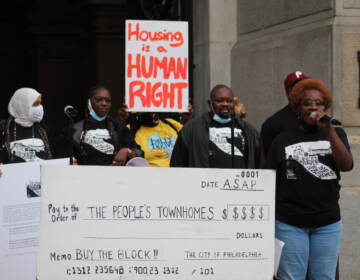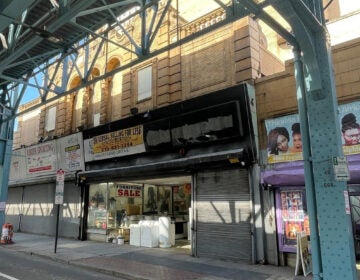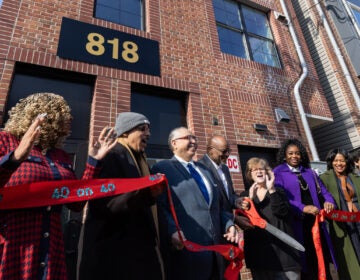Kensington Corridor Trust owns 14 local properties. It wants residents, not developers, to determine how they’re used
Amid ongoing concerns over gentrification, one community org wants residents to help shape the future of Kensington properties.
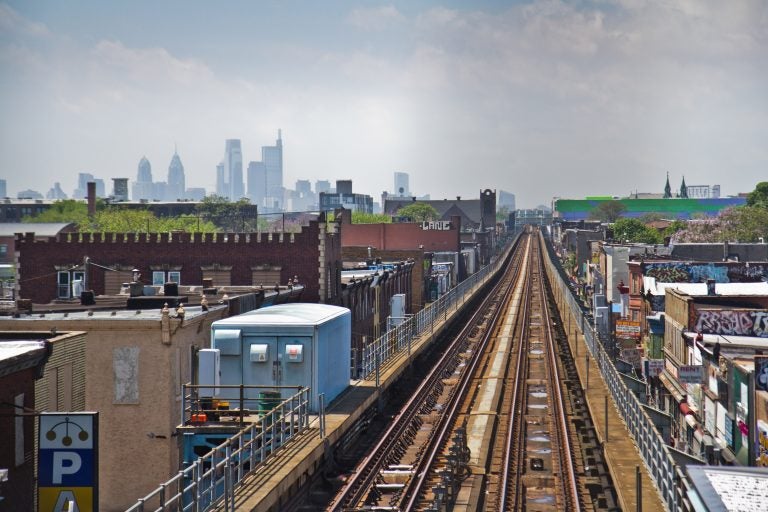
File photo: Looking out at the Philadelphia skyline from the Allegheny SEPTA station in Kensington. (Kimberly Paynter/WHYY)
In Philadelphia’s Kensington neighborhood, where the median household income is $34,374 and luxury development is on the rise, residents are concerned about being pushed out.
As developers buy up abandoned properties, and as rent prices continue to rise, many fear no longer being able to afford living in a neighborhood that’s long been home to working-class families.
One community organization has made clear it will not be selling its properties to development companies.
Kensington Corridor Trust, whose mission is to maintain affordability and culture around Kensington Avenue, is forming a new group of stakeholders who will determine how its properties are rented.
Jasmin Velez, a community organizer for KCT, pointed out that while the organization cannot stop gentrification already in full force, it strives to “preserve and ignite” local businesses that will benefit the community.
The 14 properties KCT owns, 12 vacant lots and two mixed-use properties, are assets in a trust with no beneficiaries, because the trust exists for the advancement of a cause.
The KCT Neighborhood Trust, considered a perpetual purpose trust, will operate similar to a land trust, except a nine-person trust stewardship committee will be making decisions on its behalf.
With different residential and garden trusts around the city, the KCT Neighborhood Trust is the only one of its kind.
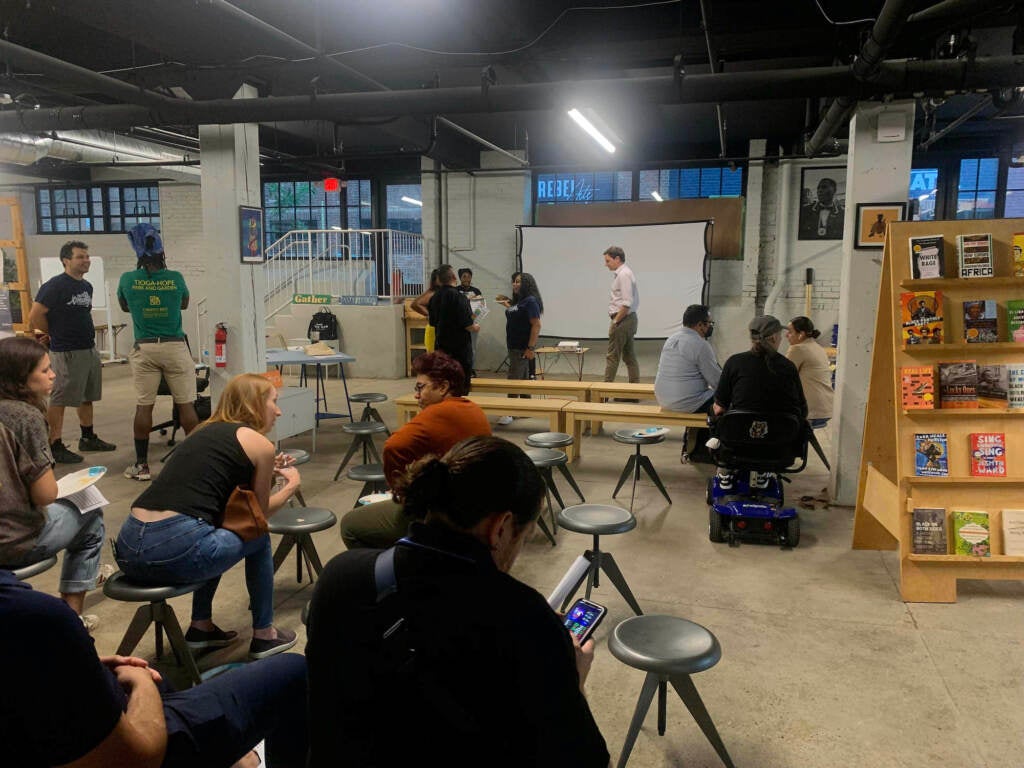
For townhomes in Germantown, Port Richmond, and Point Breeze, the Women’s Community Revitalization Project utilizes a land trust model. But land trust models for commercial spaces, like the KCT Neighborhood Trust, are unchartered territory in Philadelphia.
To decide what the KCT Neighborhood Trust should look like, KCT worked with a group of 10 residents. Among them was Neyda Rios.
“It was really nice being able to be a part of making the decisions in the neighborhood and just trying to get our neighborhood back,” Rios said.
Another member of the group, who preferred to remain anonymous, said they felt more comfortable with the organization and less skeptical once they saw Velez, someone they trust, was involved.
Kensington resident Cynthia Estremera Gauthier, the director of racial equity and engagement at Strategy Arts, a group that consulted with KCT on community engagement, said she was excited when she heard how KCT would “focus on keeping the control and the power with the residents.”
She has seen gentrification take over the Kensington area before, especially on her block at Kensington Avenue and Huntingdon Street.
“There’s just been a sort of long-term, deep gentrification process, and I was concerned about the way that would take over the areas that have long-term community residents, and the fact that so many residents had already started to be displaced,” Estremera Gauthier said.
Reshaping Kensington’s future
So far, 11 KCT properties — neighboring Kensington Avenue lots that were previously abandoned — have been revamped into a pollinator garden. Neighborhood residents, KCT, and local nonprofits now use space to host community events.
In 2023, KCT plans to build a three-story building with two apartment units that features commercial space.
The organization hopes to reinvest property profits into the community. KCT said it will only sell properties to longtime business owners committed to the area, with the goal of creating intergenerational wealth.
With the Kensington community’s priorities in mind, the KCT Neighborhood Trust Stewardship Committee will set guidelines for development and leasing properties. It will also be responsible for changing committee rules, dissolving the trust (if necessary), deciding how surplus trust proceeds are spent, selling assets, and selecting new committee applicants.
The nine-member committee will meet four times a year, and members will be compensated at double the county’s living wage. (Right now, that would amount to $35.74 per hour.)
Trust stewardship committee members will stay on for two years, and may re-apply or be re-nominated. KCT will select the first round of nine committee members from a pool of applicants and nominees, including:
- up to two Kensington residents
- up to two community leaders
- up to two youth leaders between ages 16 and 21
- a Kensington Avenue business owner or leader
- one member of KCT’s board
The committee will be responsible for selecting which KCT board member joins.
Kensington Avenue business owners, managers, or leaders are the only prospective members who do not have to be Kensington residents in order to qualify, Velez explained.
Those interested in joining or nominating someone for the KCT Neighborhood Trust Stewardship Committee may submit an application online. Applications will be accepted through the end of October.
 WHYY is one of over 20 news organizations producing Broke in Philly, a collaborative reporting project on solutions to poverty and the city’s push towards economic justice. Follow us at @BrokeInPhilly.
WHYY is one of over 20 news organizations producing Broke in Philly, a collaborative reporting project on solutions to poverty and the city’s push towards economic justice. Follow us at @BrokeInPhilly.

Subscribe to PlanPhilly
WHYY is your source for fact-based, in-depth journalism and information. As a nonprofit organization, we rely on financial support from readers like you. Please give today.



